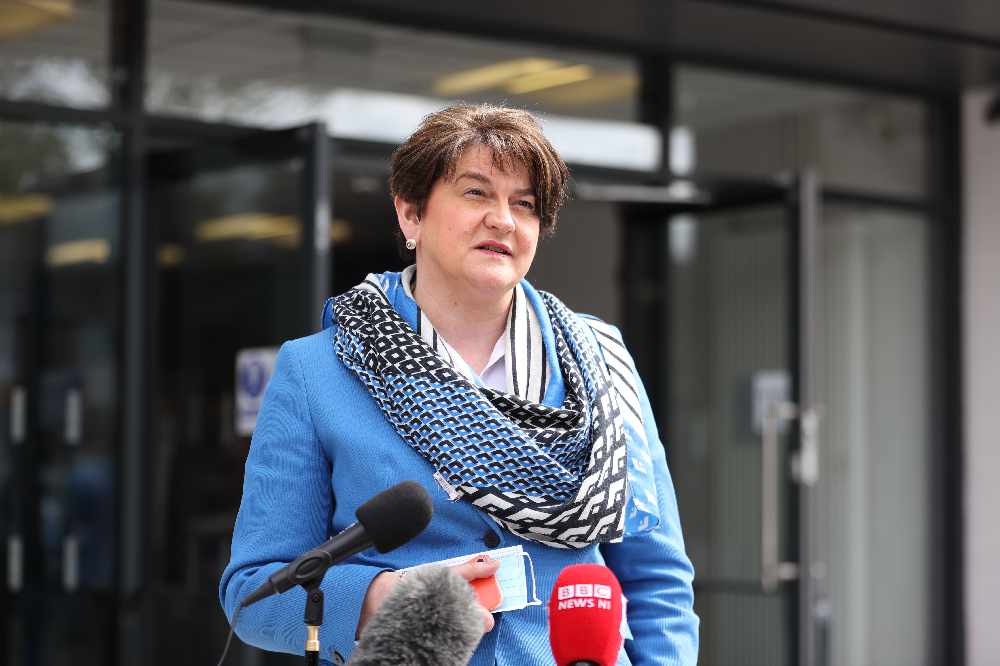
by David Young, PA
It's understood Stormont's first minister Arlene Foster is facing a battle to remain leader of the Democratic Unionist Party.
A number of MLAs four MPs and one peer have reportedly already signed the letter.
Yesterday, nearly half the party's constituency associations submitted complaints about the handling of the Northern Ireland Protocol and other issues.
The DUP has responded to reports a significant number of elected representatives have signed a letter of no confidence in party leader Arlene Foster.
The party said its internal democratic electoral processes were a matter for its members and declined to make further public comment on Mrs Foster’s future.
“The Democratic Unionist Party conducts its business in accordance with its constitution and rules,” said a party statement.
“The Officers of the Party oversee the conduct and organisation of its internal democratic electoral processes. Whilst understanding that there will be from time-to-time public interest in party processes, these issues, in the first instance, are matters for members of the party and we are not able to make any further comment at this time.”
DUP statement following leadership challenge:
— Q Radio News (@qnewsdesk) April 27, 2021
"Whilst understanding that there will be from time-to-time public interest in party processes, these issues, in the first instance, are matters for members of the party and we are not able to make any further comment at this time." pic.twitter.com/EemS5wDVd3
The statement comes amid an apparent internal heave against Mrs Foster.
There has been growing discontent among DUP members about Mrs Foster’s leadership in recent months.
The primary source of concern is her handling of the Brexit process.
The DUP is facing anger from the wider loyalist and unionist community for the introduction of an Irish Sea border.
Critics have accused Mrs Foster of failing to use the party’s influence at Westminster – particularly during its confidence and supply deal with the Conservatives – to secure a Brexit deal that saw Northern Ireland leave the EU on the same terms as the rest of the UK.
Poor polling numbers have exacerbated the discontent within the party faithful.
However, earlier today Arlene Foster played down suggestions her leadership of the DUP is under threat.
Mrs Foster was asked whether her leadership was in question on a visit to a youth centre in Belfast on Tuesday afternoon.
“Stories on leadership come up from time to time, and it’s one of those times,” she said.
“So we’ll just deal with it and move on because I’ve bigger things to do, including getting us through this Covid pandemic, including listening to the concerns of working-class communities.
“These stories come up from time to time. This is no different.
“I haven’t received any letters from constituency associations so I’m not going to get into a running commentary on these issues, they come up from time to time. I think it’s important to note that there is the big job of work to do. We have a year left of this mandate.
“It’s important that we lift our eyes and continue the work of rolling out of the restrictions, deal with the Northern Ireland Protocol.”

First Minister Arlene Foster during visit to youth centre in Belfast
While there was widespread support for ending conversion practices during the Assembly debate last Tuesday, the reach and scope of legislation was a matter of contention.
A majority of DUP members opposed a motion calling for a ban after failing to amend it.
Mrs Foster and four party colleagues, including fellow Stormont Executive minister Peter Weir and Diane Dodds, abstained in the vote on the substantive motion, rather than opposing it.
This prompted speculation of a split with more religious fundamentalist elements in the party.
The original motion said it was “fundamentally wrong to view our LGBTQ community as requiring a fix or cure”.
The DUP amendment, while supporting a potential ban on gay conversion practices, sought to include protections for “legitimate religious activities uch as preaching, prayer and pastoral support”, insisting those do not represent conversion therapies.
The amendment, which was defeated by 59 votes to 28, was criticised by political rivals for attempting to remove the line from the original motion saying it was wrong to view the LGBTQ community as requiring a “fix or cure”.
While Mrs Foster and her four party colleagues voted for the amendment they did not oppose the unamended substantive motion.


 Bikers to descend on Westminster for veterans protest against Legacy Act repeal
Bikers to descend on Westminster for veterans protest against Legacy Act repeal
 Guidance sought over future of colourful parakeets in Belfast park
Guidance sought over future of colourful parakeets in Belfast park
 Woman released after questioning over pipe bombs in Co Down
Woman released after questioning over pipe bombs in Co Down
 Suspended chief constable will not be prosecuted over alleged sexual offences
Suspended chief constable will not be prosecuted over alleged sexual offences
 MI5 files not deliberately withheld from Stakeknife probe, review concludes
MI5 files not deliberately withheld from Stakeknife probe, review concludes